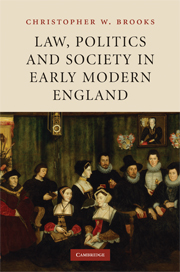Book contents
- Frontmatter
- Contents
- Preface
- Abbreviations and conventions
- 1 English history and the history of English law 1485–1642
- 2 Courts, lawyers and legal thought under the early Tudors
- 3 The initiatives of the crown and the break from Rome
- 4 Political realities and legal discourse in the later sixteenth century
- 5 The politics of jurisdiction I: the liberty of the subject and the ecclesiastical polity 1560 – c. 1610
- 6 The politics of jurisdiction II: multiple kingdoms and questions about royal authority
- 7 The absoluta potestas of a sovereign and the liberty of the subject: law and political controversy in the 1620s
- 8 The degeneration of civil society into a state of war 1629–1642
- 9 Law and ‘community’
- 10 The aristocracy, the gentry and the rule of law
- 11 Economic and tenurial relationships
- 12 The household and its members
- 13 The person, the community and the state
- 14 Conclusion
- Manuscript bibliography
- Index
- References
- Frontmatter
- Contents
- Preface
- Abbreviations and conventions
- 1 English history and the history of English law 1485–1642
- 2 Courts, lawyers and legal thought under the early Tudors
- 3 The initiatives of the crown and the break from Rome
- 4 Political realities and legal discourse in the later sixteenth century
- 5 The politics of jurisdiction I: the liberty of the subject and the ecclesiastical polity 1560 – c. 1610
- 6 The politics of jurisdiction II: multiple kingdoms and questions about royal authority
- 7 The absoluta potestas of a sovereign and the liberty of the subject: law and political controversy in the 1620s
- 8 The degeneration of civil society into a state of war 1629–1642
- 9 Law and ‘community’
- 10 The aristocracy, the gentry and the rule of law
- 11 Economic and tenurial relationships
- 12 The household and its members
- 13 The person, the community and the state
- 14 Conclusion
- Manuscript bibliography
- Index
- References
Summary
The powerful rhetorical connection Francis Ashley drew in his reading on Magna Carta between the law of England and the liberties and franchises of its freemen reflects one of the most striking features of the culture of the rule of law in the early modern period: the existence of a language of liberty. Furthermore, the subject matter of Ashley's lecture, which was concerned primarily with lesser polities and the ecclesiastical courts, as well as his later involvement in the Case of the Five Knights in the 1620s, suggests that he was expressing a version of early modern ‘rights speak’ associated as much with ordinary subjects going about their daily business as with the predicament of country squires imprisoned at the will of the crown.
On the other hand, while there was often an explicit recognition in early modern legal rhetoric of a principle of self-preservation that lay at the heart of all legal and political relationships, and a growing awareness of a distinction between the private interests of individuals and the public interests of the state, the liberties Ashley and other jurists praised were not based to any very significant extent on systematic theories of natural right. The Ciceronian values expressed so often in late sixteenth and early seventeenth-century charges at assizes and other local courts either explicitly or implicitly identified the rule of law with the protection of the subject, his family, his lands and his goods.
- Type
- Chapter
- Information
- Law, Politics and Society in Early Modern England , pp. 423 - 432Publisher: Cambridge University PressPrint publication year: 2009

